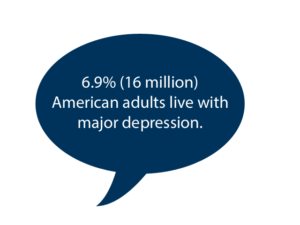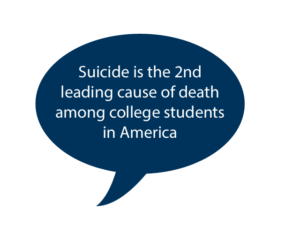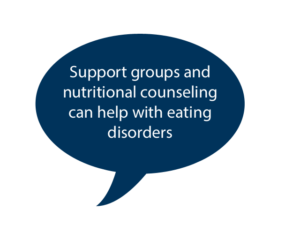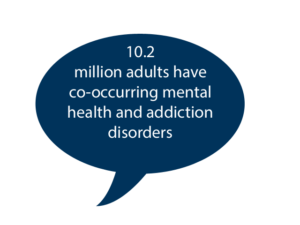As college students, life can oftentimes be super stressful. We no longer live under the umbrella of security and stability, but we’ve begun our own journey towards independence and discovering who we are meant to be. Along that journey, there are many challenges we must face that make us stronger and more capable in the long run.
 Sometimes, these struggles we face can really affect our lives and make us feel overwhelmed or hopeless. However, although it may feel like you can’t deal with the obstacles that come your way, you can always get through anything life throws at you – I believe life does not give you challenges you cannot overcome.
Sometimes, these struggles we face can really affect our lives and make us feel overwhelmed or hopeless. However, although it may feel like you can’t deal with the obstacles that come your way, you can always get through anything life throws at you – I believe life does not give you challenges you cannot overcome.
Become Aware of the Significance of Mental Health Issues
It’s important to grasp an understanding of the mental health issues that millions of people face every day. The better we understand these issues, the better we can help and prevent them. Here are the top 5 mental health challenges facing college students today:
1. Depression
Depression is a chemical imbalance in the brain that makes individuals feel helpless and detached from the world around them. The number one reason students drop out of school is depression. It affects people’s everyday lives and even hinders them from their daily tasks and activities. 
Some signs to look for if you suspect you or someone you know is depressed:
- Changes in sleeping habits, appetite, and mood
- Feeling constantly sad, angry, hopeless, or negative
- Ceasing engagement in usual activities
2. Anxiety
Most people deal with stress and anxiety throughout life and there are ways to cope with it. However, it becomes a bigger issue when you have an anxiety disorder.
For people with anxiety disorders, their disorder takes over their life and hinders them from functioning properly. Anxiety disorders cause immense stress and fear for people and it’s the most common mental health issue in America.
Some signs to look for if you suspect you or someone you know has anxiety:
- Feeling stressed, fearful, irritable, or having panic attacks
- Trouble concentrating, dizziness, upset stomach, among other symptoms
- Irregular heartbeat, shortness of breath, headaches, among other symptoms
3. Suicide
Suicide is the act of deliberately taking one’s own life. Feelings of guilt, hopelessness, and despair are commonly associated with victims of suicide as these feelings build up quickly when not addressed or dealt with. Suicide affects not only the victims but also their friends and family members. 
Some signs to look for if you suspect you or someone you know is suicidal:
- Talk about feeling trapped, feeling like they’re a burden or others would be better off without them, feeling like they have no reason for living, etc.
- Mentioning suicidal thoughts or feelings by any degree
- Lose interest in usual activities, feeling depressed or sad, and more
- Increased use of drugs or alcohol, behaving recklessly, and more
*REMEMBER:*If you suspect someone’s life is in danger, call 911 immediately and get them help!*Other Resources:NAMI
National Suicide Prevention (Available 24/7)
Crisis Text Line:
|
4. Eating Disorders
Eating disorders affect millions of college students (both men and women). These disorders are caused by serious mental and physical issues that can be life-threatening. Some common eating disorders are anorexia, bulimia, and binge-eating disorder. 
Some signs to look for if you suspect you or someone you know has one:
- Distorted or poor body image of themselves, fear of eating in public, dramatic change in eating habits
- Dehydration, irregular heartbeats, low energy, and more
- Skipping meals, restricting calories, excessive exercising, or feeling like they’re eating ‘out of control’ (bingeing), purging, a significant change in appearance, etc.
5. Drug and Alcohol Addiction
Many students turn to drug and alcohol use as a coping mechanism. This is not an effective coping skill to use as it usually ends up backfiring in the end. Addiction is a dependency and abuse of a certain substance and can lead to serious issues down the road. 
Some signs to look for if you suspect you or someone you know is struggling with addiction:
- Slurred speech; bloodshot eyes; poor coordination or focus; and anxiety, paranoia, or fear for no reason
- Sudden need for money or sudden ‘financial crisis’
- Change in appearance/grooming habits and change in activities
Support at MWCC
The Mount offers a broad variety of resources and tools to help students who are struggling. If you or someone you know is struggling with a mental health challenge, there are numerous resources to help:
- Counseling Services – Melissa Manzi, Rm. 140. (978) 630-9855 (Mon – Fri 8:00-4:00)
- Disability Support Services (for academic, social, and emotional help for students with disabilities)
- Health Services (for help with healthcare and wellness)
- The Link (for students in recovery)
- Tutoring (For help with academics)
- Others: (Food for Thought Campus Pantry, CCAMPIS Child Care, Career Services, Financial Aid, Transportation, Veteran Services, and more)
Keep Your Head Up
Mental health issues are a serious problem in America and affect the lives of millions each day. Just remember, there is a light at the end of the tunnel and things will look up. Life is full of ups and downs, some big and some small; but it’s important to remember that there is no challenge you can’t overcome and you can get through anything life throws your way. You’re not alone, there are always people here to help you if you just look around.
In conclusion, life is too precious to be unhappy. If you’re struggling, please reach out to someone and ask for help. Enjoy your life and make the most of every second because life is all about balance:
“Sometimes you need the bad days, to appreciate the good ones.” -Unknown
About the Author
 Alexandria Faneuf ’19 is a Liberal Arts major at MWCC. She is a contributing writer for the News Center.
Alexandria Faneuf ’19 is a Liberal Arts major at MWCC. She is a contributing writer for the News Center.

